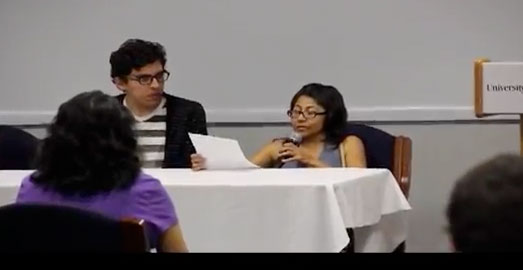Domestic workers expose workplace injustices
Broadcast reporter: Stephanie Brown. Videographer: Gary Cecil III.
Stephanie Brown
The Signal
The “Domestic Workers Tell Their Stories” event, sponsored by the office of Intercultural and International Student Services, helped reveal injustices faced by female domestic workers such as nannies and house cleaners. The bilingual event, which took place Monday, Sept. 10 at 7 p.m. in the Garden Room, kicked off Hispanic Culture Month at UHCL.
Christine Kovic, professor of anthropology and cross-cultural studies, and Susana Hernandez, assistant director of IISS, helped organize the event. Supporters of this event included the Anthropology and Cross Cultural Studies Program, Houston Interfaith Workers Justice Center, and the Institute for Interfaith Dialogue.
“[We are] trying to educate the campus community about issues and concerns facing the Hispanic Latino community, but we’re also celebrating our culture,” Hernandez said.
The purpose of the event was to create awareness regarding the mistreatment of domestic workers, many of whom are from the Hispanic community.
“We should be aware of some of the difficulties that are faced by domestic workers… and to learn a little bit about the struggles in the U.S. as well as here in Houston to try to grant protections to domestic workers,” Kovic said.
Domestic workers do not have many of the rights that are provided by other jobs. Kovic points out that domestic workers are excluded from the 1935 Fair Labor Standards Act, meaning their employers are not required to pay them overtime, and several workplace protections are unavailable to the workers.
“Domestic work is one of the most vulnerable industries because there are no regulations,” said Laura Perez-Boston, director of the Houston Interfaith Worker Justice Center. “You are typically the only employee for your employer, so there is no one to negotiate with or strategize with [if an issue arises].”
If a worker is undocumented, it may cause further mistreatment by an employer.
“It is common for undocumented workers to receive worse treatment because the employer can use their undocumented status against them,” Hernandez said.
Martha Garcia and Julia DeLeon were chosen to speak about their lives as domestic workers for American families. The organizers chose women to speak at this event because the majority of nannies and housecleaners are female and the voice of a domestic worker woman is often underappreciated.
“It’s wonderful to have the women themselves who are domestics here to tell us their own stories,” Kovic said. “Women’s stories in particular carry great power and are often ignored or overlooked.”
Martha Garcia is originally from Mexico and has been working as a nanny in the U.S. for 27 years. She said she is very proud of the work she does, but said she has faced mistreatment and injustices during her time as a domestic worker.
Julia DeLeon has been working as a domestic worker in the U.S. since 1985. She has taken care of four pairs of twins, and said she has also faced mistreatment at the hands of her employers.
Both of these women said they feel extremely close to the children they watch, and treat them as if they are their own flesh and blood.
“It is kind of hard because I have two children of my own, but I treat the children I watch as my own as well, [and] this is very intense,” DeLeon said. “It’s hard to be away from them.”
DeLeon explained that she receives no paid days off, no matter how sick she may be and no paid vacation days. There have been instances where she said her health was so poor that she could not make it to work and was fired the very next day.
Garcia shared a story of an act of abuse she experienced on the job: while cooking a stew in the kitchen of the home she was working in, the boiling contents of the stew suddenly splashed all over her body. Although she screamed in agony as the steaming broth burnt her flesh, her employer ignored her cries for help.
The intensity of the burn was realized when her skin peeled off as she tried to take off her clothes. It was only when Garcia threatened to call the police that she was taken to the hospital four hours later.
“One thing I have noticed is that [employers] don’t value the work of a woman,” Garcia said. “It’s very painful because one is short on money, one gets hungry, one gets sick. The work that we do is extremely valuable to the development of the whole country. I can only imagine how much work these families would lose if we were not there [to take care of them].”
To find out more about domestic workers in the U.S. or for more information regarding upcoming Hispanic Heritage events, visit the IISS office, SSCB 1.203, or call them at 281-283-2575.


[…] The “Domestic Workers Tell Their Stories” event, sponsored by the office of Intercultural and International Student Services, helped reveal injustices faced by female domestic workers such as nannies and house cleaners. The bilingual event, which took place Monday, Sept. 10 at 7 p.m. in the Garden Room, kicked off Hispanic Culture Month at UHCL. To read more about the event, click here. […]